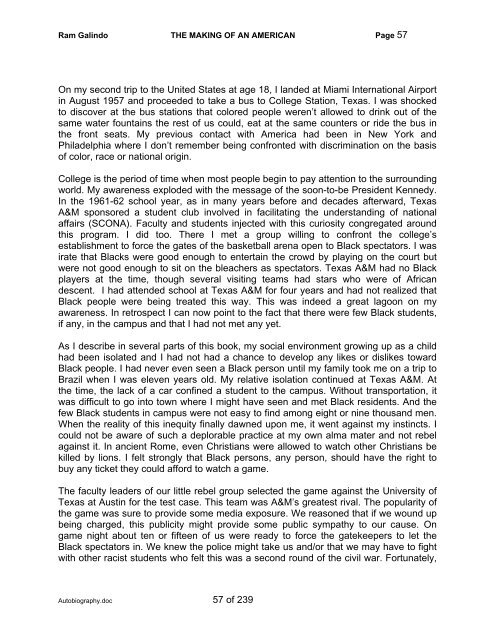Autobiography - The Galindo Group
Autobiography - The Galindo Group
Autobiography - The Galindo Group
You also want an ePaper? Increase the reach of your titles
YUMPU automatically turns print PDFs into web optimized ePapers that Google loves.
Ram <strong>Galindo</strong> THE MAKING OF AN AMERICAN Page 57<br />
On my second trip to the United States at age 18, I landed at Miami International Airport<br />
in August 1957 and proceeded to take a bus to College Station, Texas. I was shocked<br />
to discover at the bus stations that colored people weren’t allowed to drink out of the<br />
same water fountains the rest of us could, eat at the same counters or ride the bus in<br />
the front seats. My previous contact with America had been in New York and<br />
Philadelphia where I don’t remember being confronted with discrimination on the basis<br />
of color, race or national origin.<br />
College is the period of time when most people begin to pay attention to the surrounding<br />
world. My awareness exploded with the message of the soon-to-be President Kennedy.<br />
In the 1961-62 school year, as in many years before and decades afterward, Texas<br />
A&M sponsored a student club involved in facilitating the understanding of national<br />
affairs (SCONA). Faculty and students injected with this curiosity congregated around<br />
this program. I did too. <strong>The</strong>re I met a group willing to confront the college’s<br />
establishment to force the gates of the basketball arena open to Black spectators. I was<br />
irate that Blacks were good enough to entertain the crowd by playing on the court but<br />
were not good enough to sit on the bleachers as spectators. Texas A&M had no Black<br />
players at the time, though several visiting teams had stars who were of African<br />
descent. I had attended school at Texas A&M for four years and had not realized that<br />
Black people were being treated this way. This was indeed a great lagoon on my<br />
awareness. In retrospect I can now point to the fact that there were few Black students,<br />
if any, in the campus and that I had not met any yet.<br />
As I describe in several parts of this book, my social environment growing up as a child<br />
had been isolated and I had not had a chance to develop any likes or dislikes toward<br />
Black people. I had never even seen a Black person until my family took me on a trip to<br />
Brazil when I was eleven years old. My relative isolation continued at Texas A&M. At<br />
the time, the lack of a car confined a student to the campus. Without transportation, it<br />
was difficult to go into town where I might have seen and met Black residents. And the<br />
few Black students in campus were not easy to find among eight or nine thousand men.<br />
When the reality of this inequity finally dawned upon me, it went against my instincts. I<br />
could not be aware of such a deplorable practice at my own alma mater and not rebel<br />
against it. In ancient Rome, even Christians were allowed to watch other Christians be<br />
killed by lions. I felt strongly that Black persons, any person, should have the right to<br />
buy any ticket they could afford to watch a game.<br />
<strong>The</strong> faculty leaders of our little rebel group selected the game against the University of<br />
Texas at Austin for the test case. This team was A&M’s greatest rival. <strong>The</strong> popularity of<br />
the game was sure to provide some media exposure. We reasoned that if we wound up<br />
being charged, this publicity might provide some public sympathy to our cause. On<br />
game night about ten or fifteen of us were ready to force the gatekeepers to let the<br />
Black spectators in. We knew the police might take us and/or that we may have to fight<br />
with other racist students who felt this was a second round of the civil war. Fortunately,<br />
<strong>Autobiography</strong>.doc 57 of 239


